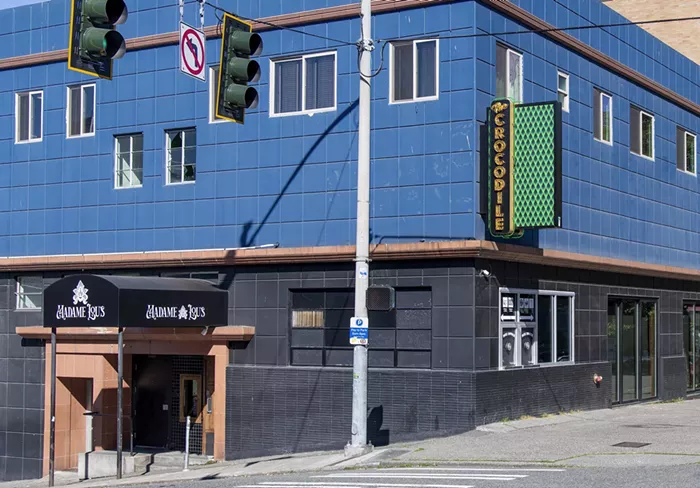This post was originally published on this site
In a devastating blow to Seattle’s arts and culture scene, Belltown’s celebrated live music venue the Crocodile plans to permanently close its two downstairs venues, Madame Lou’s and Here-After, in mid-December.
As City Cast Seattle reported on Monday, Crocodile staff confirmed that the closures were announced to employees at an all-hands meeting last week. Madame Lou’s, a 300-capacity live music club located in the Crocodile’s basement, is a mainstay for smaller artists, while the adjacent 100-seat Here-After includes a comedy club, movie theater, and bar. According to the Seattle Times, “regular operations” will cease at Madame Lou’s after December 13, then at Here-After after December 20, though the rooms may still be used for special occasions such as New Year’s Eve.
The Crocodile, which will celebrate its 35th anniversary next year, will continue operations uninterrupted, as will the upstairs Hotel Crocodile.
After the lease on its original location in Belltown expired, the Crocodile moved to a new, larger building four blocks away in 2020. Subsequently, Madame Lou’s opened in November 2021, followed by Here-After on New Year’s Day 2022.
The Crocodile’s creative director Hunter Motto tells The Stranger that half of the staff were laid off, including many part-time workers, such as security, box office, bartenders, and production managers, who will see their hours significantly reduced after mid-December. In addition, the Crocodile is transferring about 80 events booked at Madame Lou’s and Here-After to other similarly sized venues around town, such as the Sunset Tavern, Barboza, Clock-Out Lounge, and Tractor Tavern. These shows will still be produced by the Crocodile.
Motto has a laundry list of reasons that the venues are closing: the “skyrocketing” costs of goods, insurance, and operations, plus the state of the economy and decreased food and drink sales. “It’s hard to explain to the general public because we have sold-out shows on our calendar, and we did 1000 events last year. We’re so busy, and yet it’s unfortunately not enough,” he says.
The shift in food and drink sales has been particularly challenging. “The live events industry was built on a foundation of selling alcohol, and that was what subsidized the arts for music venues and clubs, particularly of the small and independent variety. And alcohol sales have ticked down every year we’ve been open, on average,” Motto says. A “good night at the Crocodile in 2019” might have meant an average of $20 in food and beverage revenue per guest, and now that number has dropped to around $15. Motto also notes that he’s been in contact with venues across the country who have noticed similar trends and had “challenging” months in August and September: “People are talking about being 25% down, anecdotally.”
According to Motto, the Crocodile tried a number of tactics before opting to close, including raising prices, enlisting help from sponsors, making staffing changes, and attempting to increase profits through private events. “We’ve changed staffing, we’ve brought on folks to help with sponsorship, we’ve refocused energy on private events, we’ve had to increase the price of our food and drinks to keep up with the cost, and it’s not enough,” he says.
“This is definitely the last thing we ever wanted to do. We’re laying off half our staff, and that includes people we mentored and helped start their careers and people who have poured so much care and attention and love into these venues,” Motto told The Stranger. “I’ve been at the Crocodile for 13 years, and this is the worst week of my time here.”
